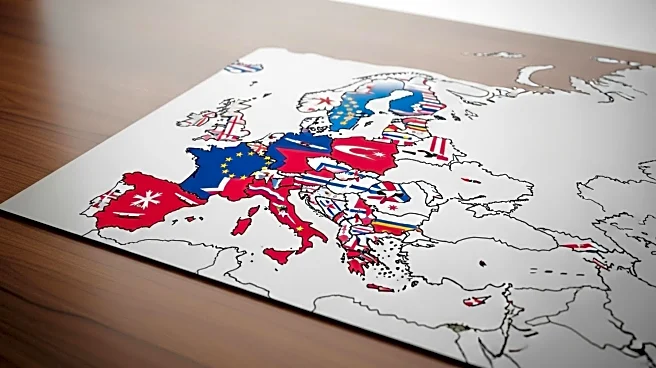What's Happening?
European Commission President Ursula von der Leyen has accused Russia of engaging in 'hybrid warfare' against Europe, citing a series of incidents that she claims are part of a concerted campaign to destabilize the region. In a speech to the European Parliament, von der Leyen highlighted recent drone and airspace incursions, cyberattacks, and election interference as examples of this warfare. She emphasized that these actions are not random but are calculated efforts to undermine European security. The incidents include violations of airspace by MiG fighters and drones flying over critical sites in several European countries. Von der Leyen warned that these activities represent a growing threat to the European Union, with undersea cables being cut and logistics hubs paralyzed by cyberattacks.
Why It's Important?
The allegations of hybrid warfare by Russia have significant implications for European security and defense policies. If true, these actions could lead to increased military spending and heightened security measures across the continent. NATO members have already pledged to increase defense spending to 5% of GDP, reflecting the perceived threat from Russia. The situation underscores the need for Europe to bolster its defenses against unconventional threats that blend military and subversive tactics. Countries on the EU's periphery, particularly those bordering Russia, are likely to be most affected, potentially leading to further geopolitical tensions and a reevaluation of defense strategies.
What's Next?
European officials are considering various measures to counter the threat of hybrid warfare. Discussions are underway about creating flagship defense projects, such as the Eastern Flank Watch initiative, which proposes a 'drone wall' network to protect against airspace violations. However, there is some ambivalence about this proposal, with Germany's defense minister expressing skepticism. The ongoing situation may prompt further diplomatic and military responses from European nations, as they seek to safeguard their security and maintain regional stability.
Beyond the Headlines
The concept of hybrid warfare challenges traditional notions of conflict, as it involves tactics that are difficult to attribute directly to a state actor. This ambiguity complicates international responses and raises ethical questions about how to address such threats. The situation also highlights the evolving nature of warfare in the modern era, where cyber and information warfare play increasingly prominent roles alongside conventional military actions.










